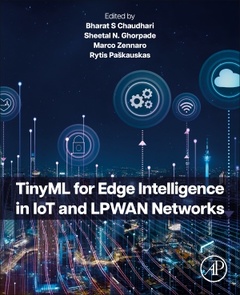Description
-
Language: English
385 p. · Paperback
Description
/li>Contents
/li>Biography
/li>Comment
/li>
TinyML for Edge Intelligence in IoT and LPWAN Networks presents the evolution, developments, and advances in TinyML as applied to IoT and LPWANs. It starts by providing the foundations of IoT/LPWANs, low power embedded systems and hardware, the role of artificial intelligence and machine learning in communication networks in general and cloud/edge intelligence. It then presents the concepts, methods, algorithms and tools of TinyML. Practical applications of the use of TinyML are given from health and industrial fields which provide practical guidance on the design of applications and the selection of appropriate technologies.
2. Embedded Systems for Ultra Low Power Applications
3. Cloud and Edge Intelligence
4. TinyML: Principles and Algorithms
5. TinyML using Neural Networks for Resource Constraint Devices
6. Reinforcement Learning for LoRaWANs
7. Software Frameworks for TinyML
8. Extensive Energy Modeling for LoRaWANs
9. TinyML for 5G Networks
10. Non-Static TinyML for Ad hoc Networked Devices
11. Bayesian-Driven Optimizations of TinyML for Efficient Edge Intelligence in LPWAN Networks
12. 6TiSCH Adaptive Scheduling for Industrial Internet of Things
13. Securing TinyML in a Connected World
14. TinyML Applications and Use Cases for Healthcare
15. Machine Learning Techniques for Indoor Localization on Edge Devices
16. Embedded Intelligence in Internet of Things Scenarios: TinyML Meets eBPF
17. A Real-Time Price Recognition System using Lightweight Deep Neural Networks on Mobile Devices
18. TinyML Network Applications for Smart Cities
19. Emerging Application Use Cases and Future Directions
Dr. Bharat S. Chaudhari is working as a Professor (HAG) in Electrical/Electronics and Communication Engineering at MIT World Peace University, Pune, India. He graduated in Industrial Electronics Engineering from Amravati University in 1989 and received M. E. Telecom. E. and PhD (Engineering) from Jadavpur University, Kolkata, India in 1993 and 2000, respectively. He has previously held positions like Principal, Dean, and Professor at various Institutes in Pune. He is a recipient of the 2020 IETE N V Gadadhar Memorial Award, the MAEER Pune’s Ideal Teacher Award 2015, and the Young Scientist Research Grant from the Department of Science and Technology, Government of India, in 2003. He was appointed as a Visiting Scientist (Simons Associate/Regular Associate) to Wireless Network Research Group, ICTP, Trieste, Italy from January 2007 to December 2020. He is a Senior Member of IEEE, Fellow of IETE, Fellow of IE (I), and a Founder Chairman of the IEEE Pune Section (2010 – 2011). He also chaired the IEEE Communications Society, Pune Chapter. He serves as a Program Evaluator of the Engineering Accreditation Commission (EAC) of ABET, United States, for accreditation of computer, communications, and similar engineering programs. His current research interest includes LPWANs, AIoT, TinyML, and Si-Photonics.
Dr. Sheetal Ghorpade is working as Director (Data Sciences) at Rubiscape Pvt. Limited, Pune, Maharashtra, India, where she is actively involved in the research and development of data science products. She received her PhD in Applied Mathematics and MSc in Mathematics from the University of Pune, India. She is a Regular Associate (Visiting Scientist) at the Abdus Salam International Centre for Theoretical Physics in Trieste, Italy. Her career represents a great mix of data analytics and high-quality internationally collaborative research on algorithms and optimization for Industry problems. Her research interests are Optimization Techniques, Arti
- One-stop solution for emerging TinyML for IoT and LPWAN applications
- Explains the principles and methods of TinyML with a focus on how it can be used for IoT, LPWANS and 5G applications.
- Presents applications from the health and industrial fields
- Provides guidance on the design of applications and the selection of appropriate technologies.
These books may interest you

Artificial Intelligence in IoT 121.31 €



